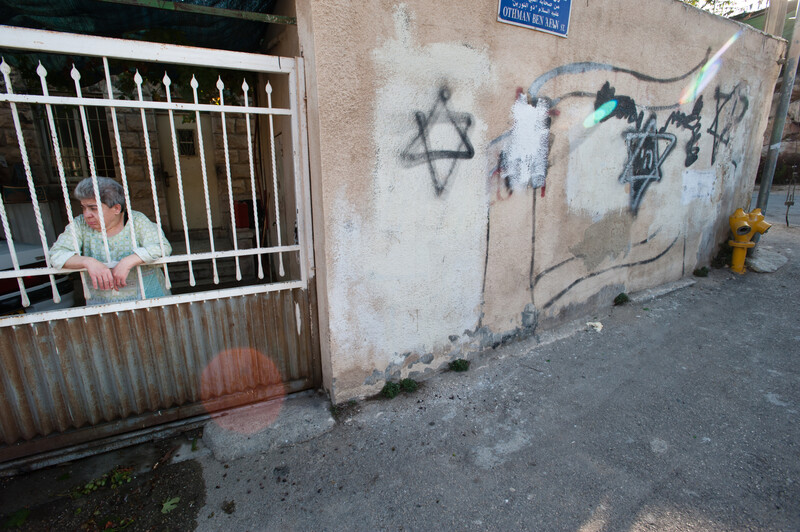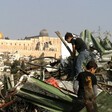The Electronic Intifada 18 November 2011

Israeli policies are pushing Palestinians out of East Jerusalem in favor of Israeli settlers.
The recent forced closures of Palestinian nonprofit organizations in Jerusalem is an example of the Israeli authorities’ continued attacks on the city’s Palestinian identity and their attempts to maintain control over occupied East Jerusalem, according to local human rights groups.
“The purpose is to control and undermine the role of Palestinian civil society and [its] efforts in Jerusalem,” Rashad Shtayyeh, the activities coordinator at the Civic Coalition to Defend Palestinians’ Rights in Jerusalem (CCDPRJ), told The Electronic Intifada by email.
“Also, [this Israeli policy] tries to restrict anything that might help in protecting the Palestinian identity in Jerusalem, as a part of the Israeli Judiazation project in occupied Jerusalem,” Shtayyeh explained.
On 25 October, Israeli police presented closure notices to four Jerusalem-based organizations — Shua’a Women’s Association, al-Quds Development Foundation, Saeed Education Center and Work Without Borders — for a one-month period.
Given thirty minutes to leave
Dr. Nufuz Maslamani is the director of the Shua’a Women’s Association, a group that was founded in 2008 with the goal of empowering women in Jerusalem to achieve their social, political and economic rights. She told The Electronic Intifada that Israeli police gave volunteers at the association thirty minutes to leave their office before they locked the door.
“I said, ‘Why do you want to close it?’ I said that we are a women’s association and that we are working with women, with gender issues. [The police officer] said, ‘No, you are doing activities for the Popular Front [for the Liberation of Palestine, PFLP],” Maslamani explained.
“As always, they have a lot of reasons to close any association, to stop anyone who is working in Jerusalem. They continue their policy to make Jerusalem empty of the Palestinian people. This is their policy. That’s why they closed the association,” she said.
Maslamani said that the closure has already had a negative impact on the Palestinian women and children who take courses through the association.
“This is really a problem because we now have women who are taking computer courses, and other courses. These women feel that they have a purpose and that they can do anything,” she said, adding that she feared the one-month closure order would be arbitrarily extended.
“The most dangerous thing is that the Palestinian people can’t live or do what is right for them. This is our right, to continue our lives in Jerusalem, as all women and people in the world.”
History of closures in Jerusalem
According to the Civic Coalition for Defending Palestinians’ Rights in Jerusalem (CCDPRJ), since August 2001, the Israeli authorities have closed approximately 28 organizations serving the Palestinian community in Jerusalem, including the Orient House, the Palestine Liberation Organization’s (PLO) former headquarters in the city, the Jerusalem Chamber of Commerce and the Arab Studies Society.
In 2009, the Israeli authorities also banned numerous Palestinian cultural and educational events scheduled to celebrate the declaration of Jerusalem as the “Capital of Arab Culture” for that year.
“The closure of these and other Palestinian institutions are part of a broader policy through which the Israeli authorities seek to stifle Palestinian development in Jerusalem and increase the strength of Israel’s occupation over East Jerusalem,” explained Shtayyeh. “These closures relate to the overarching policy that includes violations of housing rights, revocation of residency, and ultimately results in the forced displacement of Palestinians from Jerusalem.”
Most Palestinians living in East Jerusalem have residency rights, not full Israeli citizenship, since they refused to take Israeli passports on principle shortly after Israel began occupying the West Bank and Gaza Strip in 1967.
As such, Palestinian Jerusalemites have the right to live and work in Israel yet are denied other provisions that come with full Israeli citizenship. For instance, unlike citizenship, permanent residency is only passed on to a person’s children if certain conditions are met, including most notably proving that one’s “center of life” is in Jerusalem.
Since 1967, it is estimated that more than 14,000 identification cards have been revoked from Palestinian Jerusalemites, who have thereby lost their residency rights and the ability to live in the city.
Widespread attack on human rights groups
The Jerusalem-area closures come as the Israeli parliament, the Knesset, is expected to pass two new bills that would make it harder for human rights groups in the country to receive funding from foreign governments.
On 13 November, the Israeli Ministerial Committee on Legislation voted in favor of two new bills. The first, officially known as the Associations Law (Amendment — Banning Foreign Diplomatic Entities’ Support of Political Associations in Israel), would bar human rights groups from receiving donations of more than 20,000 NIS (roughly $5,400) from foreign state entities.
The second bill, an amendment to the Israeli Income Tax Order, would make funding from foreign state entities to Israeli nongovernmental organizations subject to a 45 percent taxation rate. This is more than three times more than the taxation rate incurred by private organizations.
On 10 November, 18 human rights groups in Israel, including Adalah — the Legal Center for Arab Minority Rights in Israel, Physicians for Human Rights-Israel and the Arab Association for Human rights, released a statement condemning the bills.
“This is not the first time Knesset members target foreign funding as a way to silence civil society and human rights organizations. The bills are a part of a calculated policy to silence voices of dissent and criticism and go hand in hand with attempts to restrict Israel’s judicial system, media outlets and activists,” the statement reads (“NGOs in Israel: Urgent call regarding severely restrictive funding bills,” 10 November 2011).
“A vibrant civil society is an essential part of a healthy democracy,” the statement adds. “These organizations promote transparency, public debate and accountability regarding government policy, and ensure essential protection of more vulnerable communities.”
According to the Mossawa Center, a group representing Palestinians in Israel, the bills would have the biggest impact on organizations working for the rights of Israel’s Palestinian citizens.
“Many Israeli NGOs [nongovernmental organizations] do not receive funding from the Israeli government because of their work with the Palestinian Arab minority. They are forced to rely on foreign state entities, like the EU and European government-sponsored organizations, for a majority of their funding,” Mossawa explained in a statement (“The Mossawa Center calls on the international community to condemn bills that restrict funding for human rights organizations in Israel,” 16 November 2011 [PDF]).
“While the NGO bills directly hinder the ability of Arab and human rights NGOs to operate independently within Israel, right-wing organizations that violate international law by supporting settlements in the West Bank are not limited in the proposed legislation,” Mossawa adds. “Most right-wing organizations are funded by the state and/or foreign private donations, which the bills’ sponsors do not consider foreign interference. It is clear that the proposed legislation would conceal the state’s human rights violations and advance the government’s right-wing agenda without impediment.”
Protected under international law
In Jerusalem, CCDPRJ’s Rashad Shtayyeh explained that “East Jerusalem is incontrovertibly recognized under international law as an integral part of the occupied Palestinian territory over which the Palestinian people are entitled to exercise their right to self-determination.”
Indeed, the Fourth Geneva Convention states: “Protected persons are entitled, in all circumstances, to respect for their persons, their honor, their family rights, their religious convictions and practices, and their manners and customs.”
Article 1 of the International Covenant on Economic, Social and Cultural Rights also stipulates that “All peoples have the right of self-determination. By virtue of that right they freely determine their political status and freely pursue their economic, social and cultural development.”
In his email to The Electronic Intifada, Shtayyeh explained that these protected rights — as well as freedom of expression, association and peaceful assembly — are regularly denied to Palestinians in East Jerusalem.
“We call upon the international Community, the United Nations and the European Union to take responsibility to uphold their obligations towards the protected persons under occupation in Jerusalem,” he said. “We demand that the international community obliges the Israeli government to refrain from closing the Palestinian institutions in East Jerusalem.”
Tags
- East Jerusalem
- Rashad Shtayyeh
- Civic Coalition to Defend Palestinians' Rights in Jerusalem
- Shu'a Women's Association
- al-Quds Development Foundation
- Saeed Education Center
- Work Without Borders
- Dr. Nufuz Maslamani
- Israeli Knesset
- Israeli Ministerial Committee on Legislation
- Associations Law
- Israeli Income Tax Order
- Adalah
- Physicians for Human Rights-Israel
- Arab Association for Human Rights
- Mossawa Center

